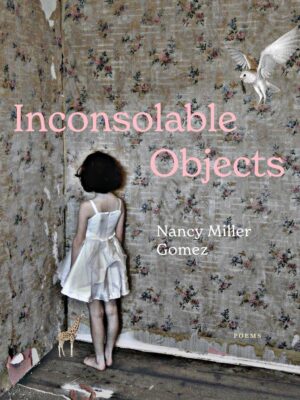In Their Own Words
Nancy Miller Gomez on “Snapshot”

Snapshot
I was a hand grenade of a girl
vacuum packed into a dress
that bound my body
like a bandage staunching a wound.
My arms were cinched in tourniquets
of tulle, my throat choked in a rage
of lace. I’d hacked my hair into chaos,
kept it ragged and short, kept my fists
clenched in the fuselage of my lap. My eyes –
two foxholes. No light escaped. My lips
stretched across my face like a trip wire.
The man with the camera said, you can do better.
Give me a smile. I set my mouth
into the look I’ve kept all these years.
That’s still me in the photo,
waiting to pull the pin.
Reprinted from Inconsolable Objects (YesYes Books, 2024) with the permission of the author.
On "Snapshot"
On a shelf in a corner of my bedroom, sits a grouping of framed photos. They include the usual suspects: my children as toddlers and as teens; my grandchildren as babies; my parents before they died; my husband and I shortly after we got engaged.
There are also two photos set off by themselves, facing each other. One is my husband’s first-grade school photograph. He is gazing at the camera with his guileless expression, a loveable boy who appears exactly like the adult he became. He smiles sweetly out of the frame at another photo that has been placed next to his. It is a photo of me at the same age, my first-grade school photo. I do not look sweet in my picture. Nor do I look loveable. I look like an animal that has been captured or perhaps, more accurately, like a small explosive device. I am clearly enraged. And yet I am smiling. But it is not a natural expression. It’s as if someone is threatening me at gunpoint to smile.
As a child I was unable to fake a smile, not because I was unwilling to, but because I simply didn’t know how to curl my mouth into a shape to make it look as if I was smiling when I wasn’t. That is something I still have a problem with, although I’ve learned over the years not to barre my teeth or stretch my lips into a clownish grimace. Being told to smile was akin to being told to feel happy - and on that day I was decidedly not happy.
In the photo, I am wearing a dress. The only thing I hated more than taking a bath or having my hair-brushed was wearing a dress. Wearing that dress felt like being strangled. It is one of those ruched, frilly things that little girls of that age were forced into for special occasions. I am also sporting a new haircut, one I have given myself so that I could avoid the hated ritual of having my hair brushed. All these years later, I remember how my mother turned her face away when she saw I had chopped my hair into an unfixable mess no beauty salon could ever repair. In the picture I am wearing garish colored barrettes, my mother’s futile attempt to clip what hair was left into some semblance of a style. I remember going to school that day feeling betrayed. I suspect my mother had chosen that most hated of girly dresses to compensate for my undeniably boyish haircut.
That photograph stands as a memorial to the girl I was. I can’t look at it without feeling a twinge of gratitude, because ultimately, I wasn’t forced into becoming some lacy, sweet thing. Instead, I grew into who I was supposed to be. And while I’m no longer opposed to bathing, I still hate to brush my hair, or wear shoes. I still don’t know how to fake a smile. And I wouldn’t ever be caught dead wearing that dress.
This poem is a tribute to the little girl captured in that photo. As such, it is both ekphrasis and origin story.



